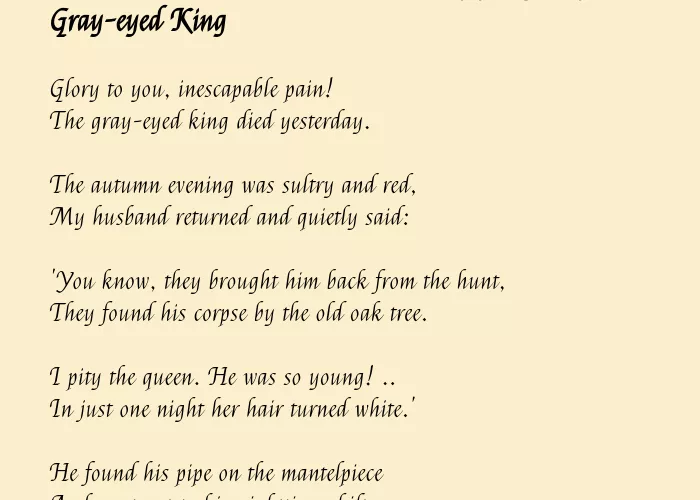Welcome to Poem of the Day – Gray-Eyed King by Anna Akhmatova.
Anna Akhmatova’s poem Gray-Eyed King is an exemplary piece of her work that deftly weaves together themes of love, power, and loss, exploring complex emotional states with stark, concise language. Akhmatova, one of the most prominent Russian poets of the 20th century, was known for her emotional depth and her ability to distill the essence of a moment into an evocative image or phrase. Gray-Eyed King stands as a testament to her prowess, where she captures not just the individual’s experience, but the broader human condition.
Gray-Eyed King Poem Explanation
The title, Gray-Eyed King, immediately introduces a striking figure—one who is both majestic and mysterious. Gray eyes, often associated with a calm and distant gaze, reflect a certain coldness or emotional detachment. Yet, in Akhmatova’s usage, the “king” adds an aura of power and authority, hinting at someone who commands, who holds sway over those around them. The gray-eyed king is thus both a figure of strength and emotional aloofness, setting up a tension that runs throughout the poem.
In literature, kings are often used as symbols of ultimate power, of control over their domain. But Akhmatova complicates this traditional image by imbuing her king with an inherent emotional distance, making him less of a figure to admire and more of a complex, ambiguous character. This approach reflects Akhmatova’s broader themes of love and loss. She frequently portrayed relationships marked by suffering or unattainable desire, and in the Gray-Eyed King, the king’s emotional detachment could signify a metaphor for the futility or unattainability of love itself.
Love, Power, and Distance
Akhmatova’s Gray-Eyed King is not simply an exploration of an individual’s emotional landscape but a commentary on the relationship between power and love. The poem’s imagery points to a king who, despite his regal stature, remains emotionally distant, reflecting the distance between the lover and the object of their affection. The “gray-eyed” nature of the king further suggests an inability to connect on a deeper, more intimate level—his eyes are not full of the warmth or passion that we might expect from a lover, but rather they are distant, neutral, and detached.
This detachment can be interpreted in various ways. Perhaps it reflects the nature of power itself—those who wield power are often forced to maintain emotional distance in order to assert control. Power, in this case, requires a certain coldness. But it could also point to the nature of love in Akhmatova’s work: a kind of unrequited love, or a love that is unable to flourish because of emotional barriers.
Moreover, the king’s power can be seen as an illusion. Despite his external authority, he may be just as vulnerable and human as those who adore him. This juxtaposition of strength and vulnerability forms a central emotional tension in the poem, making the king a tragic figure, rather than a straightforwardly heroic one.
The Poem’s Structure and Language
Akhmatova’s writing is marked by its simplicity and precision, and Gray-Eyed King is no exception. The poem does not rely on ornate language or complex metaphors; instead, it communicates its emotional content with starkness and clarity. The directness of the language contributes to the poem’s melancholy tone. There is no escape from the emotional weight of the king’s gray eyes; his detached gaze mirrors the emotional distance the speaker feels.
The use of concise, unadorned language also mirrors the theme of emotional detachment. The king’s gaze, and by extension his power, seems both unreachable and unyielding. Yet, this simplicity does not detract from the emotional intensity of the poem. Instead, it emphasizes the starkness of the feelings involved—feelings of longing, unrequited affection, and the overwhelming nature of an unapproachable figure.
Akhmatova’s mastery of tone is evident in the poem’s careful pacing. There are no excessive flourishes or elaborations. Each word is weighted, and each line builds on the last, creating a rhythm that intensifies the emotional undercurrent of the poem. This controlled pacing mirrors the speaker’s emotional state, perhaps reflecting the slow, deliberate unraveling of the connection with the king.
The Gray-Eyed King as a Metaphor for the Poet’s Life
Many critics have pointed out that Akhmatova’s work often draws from her personal experiences, particularly her turbulent relationships and the political oppression she faced during her life in Soviet Russia. While Gray-Eyed King does not directly address political themes, it can be interpreted as a metaphor for Akhmatova’s own relationship with power and the limitations of love. Akhmatova herself was known to experience profound personal suffering, much of it tied to her experiences of love and loss.
The king, with his emotional detachment, can be seen as a representation of the political authorities under which Akhmatova lived—a cold, unreachable power that cannot be loved or understood. This interpretation adds an additional layer of depth to the poem, suggesting that the emotional distance of the king is not only personal but political, reflecting Akhmatova’s own relationship with the powerful forces of her time.
Conclusion
In Gray-Eyed King, Anna Akhmatova masterfully explores the intersection of love, power, and emotional distance. The king, with his aloofness and regal power, stands as a complex symbol of unattainable desire, power, and vulnerability. Through her use of simple but powerful language, Akhmatova creates a poignant and timeless image of emotional detachment, reflecting not only the poet’s personal experiences but the broader human condition. The king’s gray eyes, distant and cold, are a powerful metaphor for love that cannot be fully realized, and the poem stands as one of Akhmatova’s finest meditations on the tensions between affection and control, intimacy and distance.

